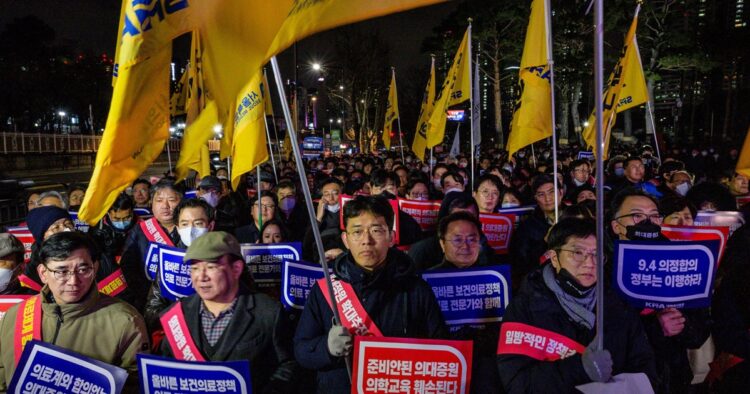Trainee doctors in South Korea’s major hospitals have initiated a walkout to oppose a government proposal to increase medical school admissions. This move has disrupted medical services for numerous patients, according to health authorities.
The government’s plan aims to raise medical school admissions from 3,000 to 5,000 by 2025 and add 10,000 more by 2035. The goal is to enhance healthcare accessibility in remote regions and address the demands of an aging population.
However, doctors and medical students participating in the protest argue that South Korea already has an adequate number of physicians. They advocate for improvements in pay and working conditions, especially for specialists in challenging fields like pediatrics and emergency medicine, before increasing student intake.
Vice Health Minister Park Min-soo urged protesters to prioritize patient care over collective action. Despite government orders to remain at work, a significant number of doctors—approximately 7,813—have joined the walkout, citing the order as unconstitutional.
The ongoing protests have led to overcrowding in hospital emergency rooms, with major hospitals in Seoul canceling a substantial portion of scheduled surgeries. This situation has raised concerns about patient care and treatment delays.
Recent polling data revealed that 76% of South Koreans support the government’s plan to expand medical student enrollment. The rationale behind this support stems from worries about severe staff shortages, particularly in pediatrics, emergency units, and clinics outside of Seoul.
South Korea’s doctor-to-population ratio remains below the OECD average, with only 2.6 doctors per 1,000 people in 2022. This disparity underscores the pressing need for addressing healthcare workforce shortages.
The Korea Interns and Residents Association, representing protesting doctors, emphasizes their demand for better treatment, including increased pay. They also criticize the government’s plan as a political maneuver ahead of the upcoming general election in April.
In a statement, the association asserts their refusal to accept medical policies crafted solely for electoral gain. Despite challenging training environments, they express solidarity in resisting policies deemed detrimental to healthcare provision.

















Comments